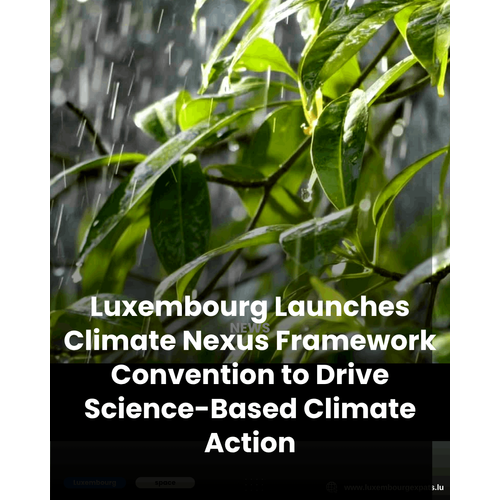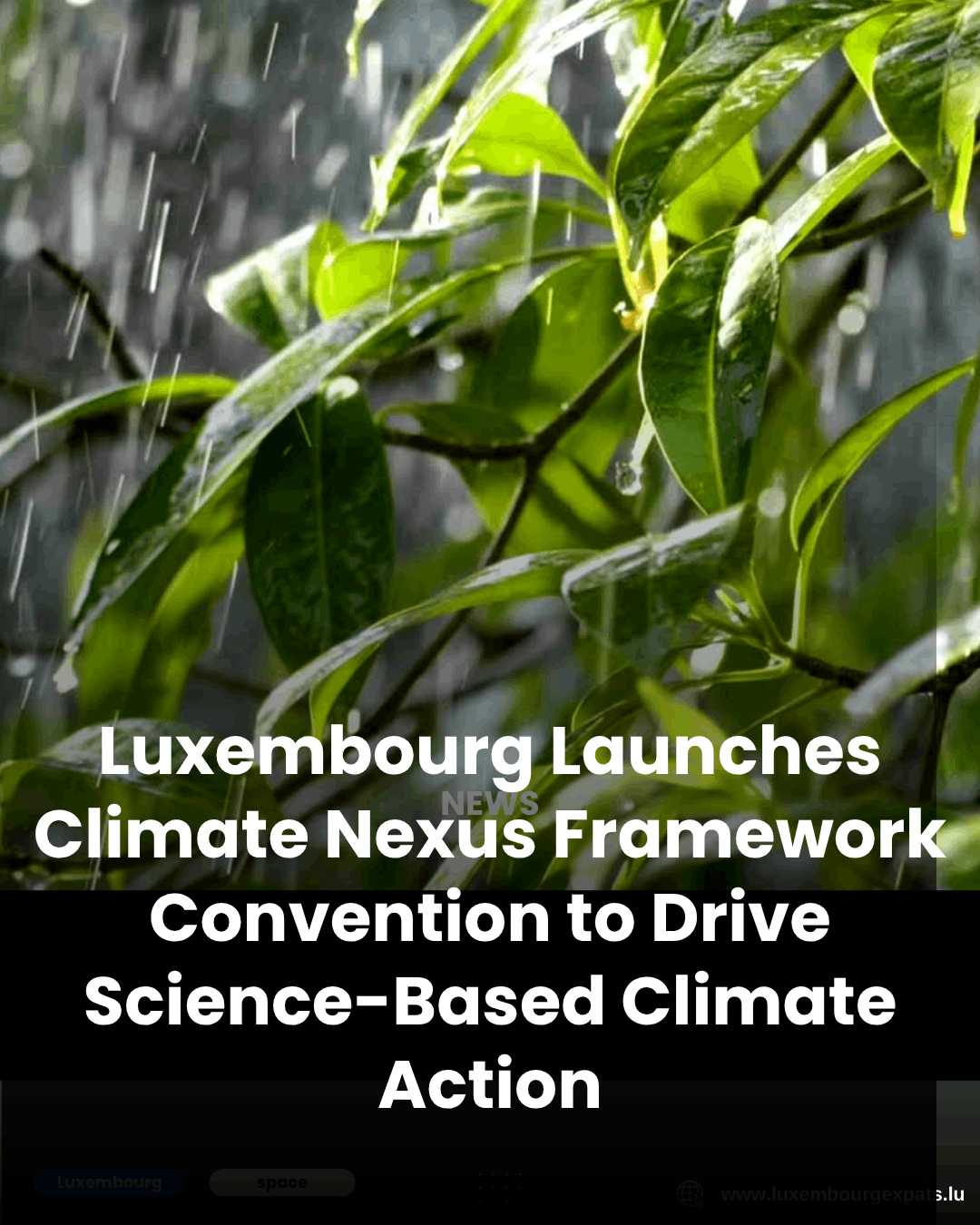Luxembourg Launches Climate Nexus Framework Convention to Drive Science-Based Climate Action
LuxembourgPosted on 25 July 2025 by TeamLuxembourg, July 25, 2025 – Luxembourg has taken a bold step toward a sustainable future with the signing of the Climate Nexus Framework Convention, a groundbreaking initiative rooted in the Paris Agreement and the UN 2030 Agenda. Signed by representatives from the Ministry of the Environment, Climate and Biodiversity, the Ministry for Research and Higher Education, and the University of Luxembourg, the convention aligns national strategies with global science-policy platforms like the Intergovernmental Panel on Climate Change (IPCC) and the Intergovernmental Science-Policy Platform on Biodiversity and Ecosystem Services (IPBES). This ambitious framework positions Luxembourg as a leader in science-driven climate governance and inclusive sustainability.A Holistic Approach to Climate ActionThe Climate Nexus Framework Convention introduces a comprehensive strategy to address interconnected challenges of climate, biodiversity, water, food, and social equity. Built around six “readiness” pillars, the initiative mobilizes Luxembourg’s scientific, educational, and policy communities to drive transformative projects in social, environmental, and engineering sciences. These pillars are:
- Social Readiness: Promotes citizen science, participatory governance through initiatives like the Klima Biergerrot, sustainable lifestyles, and youth engagement to foster broad societal involvement.
- Institutional Readiness: Enhances climate services and systemic risk monitoring using socio-environmental data, including mapping chemical substances harmful to human health and ecosystems.
- Technological Readiness: Advances Luxembourg’s goal of climate neutrality by 2050 through research and pilot projects in carbon capture, utilization, and storage (CCU/S) and nature-based solutions.
- Global Readiness: Supports the IPCC’s 7th Assessment Cycle on mitigation by hosting part of its technical support unit and fostering partnerships with the Global South, aligning with Luxembourg’s upcoming 2026-2030 international climate finance strategy.
- Academic Readiness: Strengthens interdisciplinary research and sustainability education across university programs.
- Climate Nexus Across Disciplines: Provides a flexible framework to address emerging crises and set adaptive priorities, supported by the newly established Luxembourg Centre for Socio-Environmental Systems (LCSES) under Prof. Ralf Seppelt.Empowering Interdisciplinary SolutionsAt the heart of the convention is the Climate Nexus approach, which emphasizes the interdependence of climate and socio-environmental systems. The University of Luxembourg will lead efforts to explore, test, and scale climate-related transformations through interdisciplinary research, data-driven analysis, and inclusive public engagement. Key initiatives include public outreach, youth education programs through the Scienteens Lab & Academy, and a new cross-university sustainability course to ensure widespread participation.The convention also aligns with Luxembourg’s 2023-2028 coalition agreement, accelerating national and global sustainability targets. The establishment of the LCSES in 2025 marks a significant milestone, enabling the University to integrate sustainability and climate action across its research, teaching, and public engagement activities.Leadership VoicesMinister of the Environment, Climate and Biodiversity Serge Wilmes hailed the convention as a national and global milestone. “With the Climate Nexus Framework Convention, Luxembourg further deepens its commitment to science-based climate action and inclusive sustainability,” he said. “By bridging research, international cooperation, education, and policy, we are laying the foundation for a climate-resilient future—one that empowers our youth, strengthens our institutions, and connects local innovation to global solutions. This initiative signals to the international community that Luxembourg is ready to lead by example.”Minister for Research and Higher Education Stéphanie Obertin emphasized the role of research in addressing societal challenges. “This convention reflects the government’s determination to put research at the service of society and tackle climate, environmental, and societal challenges concretely,” she stated. “As the minister responsible for the University of Luxembourg and public research centers, I commend the resolutely interdisciplinary approach of the Climate Nexus Framework Convention. It shows that science, reliable data, and collective engagement are essential to steer our country through the ecological and digital transitions.”Prof. Jens Kreisel, Rector of the University of Luxembourg, highlighted the university’s strategic focus. “Sustainable and societal development is one of our three main priorities, alongside digital transformation and medicine and health,” he said. “The creation of the Luxembourg Centre for Socio-Environmental Systems in 2025 was a decisive leap forward. Thanks to the support of the Ministry of the Environment, Climate and Biodiversity, this convention will deploy interdisciplinary research, teaching, and public engagement on sustainability and climate for the benefit of Luxembourg and beyond.”A Model for Global CollaborationThe Climate Nexus Framework Convention positions Luxembourg as a hub for innovative climate solutions, connecting local action to global challenges. By supporting the IPCC’s work and fostering partnerships with the Global South, Luxembourg is reinforcing its role in international climate governance. The convention’s emphasis on inclusive engagement, from citizen science to youth education, ensures that sustainability is a shared responsibility across society.As Luxembourg moves toward its 2050 climate neutrality goal, the convention provides a dynamic framework to navigate the complexities of the ecological and digital transitions. With its interdisciplinary and collaborative approach, the Climate Nexus Framework Convention sets a new standard for science-based climate action, offering a model for nations worldwide.
For more information, contact the Ministry of the Environment, Climate and Biodiversity, the Ministry for Research and Higher Education, or the University of Luxembourg.
Source: Press release by the Ministry of the Environment, Climate and Biodiversity / Ministry for Research and Higher Education / University of Luxembourg
gouvernement.lu/en/actualites/toutes_actualites/communiques/2025/07-juillet/25-obertin-wilmes-convention.html
I am your contact
Team
Chat









